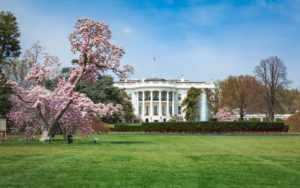
Congress certifies the electoral college vote for President-Elect Joe Biden, EPA establishes the first greenhouse gas emissions standards for aircraft in the United States, and more…
IN THE NEWS
- The U.S. Congress certified the electoral college vote ratifying President-Elect Joe Biden’s victory over President Donald J. Trump. Congress reconvened to certify the electoral college results after a mob of President Trump supporters stormed the U.S. Capitol building during the certification process. The attack on the Capitol occurred after President Trump addressed his supporters, urging them to contest the results of the presidential election. When Congress reconvened, some U.S. Senators withdrew their objections to the election results. Senator Kelly Loeffler (R-Ga.) said that the storming of the Capitol building “forced me to reconsider, and I cannot now in good conscience object to certification of these electors.” In a statement after the certification, President Trump committed to an “orderly transition” of power.
- The U.S. Environmental Protection Agency finalized a rule that sets greenhouse gas emissions standards for certain aircraft for the first time in the United States. The Natural Resources Defense Council criticized the standard because it codifies an emission limit set in 2017 by a United Nations agency that has already been met by major airlines. Liz Jones, staff attorney at the Center for Biological Diversity, added that the new rule fails to require the aviation industry to adopt new technologies that are known to be cost effective and environmentally friendly.
- United Kingdom Prime Minister Boris Johnson announced that England would begin a national lockdown that will continue through the middle of February. Johnson issued the lockdown order in response to the outbreak of a new variant of the coronavirus that is between 50 and 70 percent more transmissible. In England, people may only leave home to shop for essentials, exercise, seek medical assistance, escape domestic abuse, or—in some case—work. Johnson added that he hopes that all nursing home residents, people over the age of 70, frontline health and social workers, and clinically high risk individuals will have been offered the first dose of the vaccine by the middle of February.
- Congress—including over 100 Republican lawmakers—voted to override President Trump’s veto of the National Defense Authorization Act. President Trump opposed the act in part because it required the Pentagon to rename military bases and installations named after Confederate leaders. Senator Mitch McConnell (R-Ky.) reportedly stated that the bill was “a tremendous opportunity to direct our national security priorities to reflect the resolve of the American people and the evolving threats to their safety.” Senator Jack Reed (D-R.I.) stated that the override—the first of its kind during the Trump Administration— was “undoubtedly a bipartisan rebuke of President Trump.”
- The Bureau of Land Management finalized a plan to allow oil and gas leasing in about 18.6 million acres—or 82 percent—of Alaska’s National Petroleum Reserve. In support of the plan, Chad Padgett, Alaska state director at the Bureau of Land Management, stated that the bureau achieved “a balance between conservation stewardship, being a good neighbor, and responsibly developing our natural resources.” Nicole Whittington-Evans, Alaska program director at Defenders of Wildlife, lamented that the plan would “auction off critical habitat” for polar bears and “exacerbate the climate crisis in a region that is already experiencing warming twice as fast as anywhere on the planet.”
- The U.S. Department of Labor finalized a rule that changes the method of determining if a worker is an unregulated independent contractor or an employee who must be paid minimum wage and overtime. The new method uses a multifactor test designed to determine if the worker is economically dependent on the employer, such that the worker is an employee. The new rule may block ridesharing drivers from claiming employee status. The National Employment Law Project condemned the rule as “anti-worker” and inconsistent with Congress’s intention to maximize worker protections under the Fair Labor Standards Act.
- The Office of the Comptroller of the Currency determined that federal savings associations and national banks can participate in blockchain networks and make transactions using stablecoins. Stablecoins are cryptocurrencies that are less volatile because their value is tied to government-issued currency. Acting Comptroller of the Currency Brian Brooks said that the rule will allow banks to develop new, real-time payment technologies without lingering legal uncertainty.
- EPA finalized a rule that requires the agency to make scientific justifications for significant regulatory decisions publicly available. EPA Administrator Andrew Wheeler said that the new requirements will not risk the privacy of study participants because “no private information will be released as a result of” the rule. Some researchers argue that the rule allows EPA to disregard certain critical studies that rely on private medical records. Former director of EPA’s Science Advisory Board, Christopher Zarba, reportedly called the rule “a bold attempt to get science out of the way so special interests can do what they want.”
- Seven states and the District of Columbia filed a complaint against the Office of the Comptroller of the Currency alleging that the agency lacked the authority to issue its “true lender” rule. The rule establishes that, when a nationally chartered bank partners with a nonbank, the true lender subject to regulatory requirements is the party named as the lender in the loan agreement or the party that funded the loan. New York Attorney General Letitia James, who is leading the lawsuit, stated that the rule unleashes “predatory lenders on unsuspecting New Yorkers in the midst of a pandemic” because it allows “rent-a-bank schemes” where national banks enable nonbank lenders “to evade state consumer protection laws.”
WHAT WE’RE READING THIS WEEK
- The Congressional Research Service (CRS) released a report documenting Federal Bureau of Investigation facial recognition programs used to support federal, state, and local law enforcement. Currently, non-binding federal guidance prohibits law enforcement agencies from relying solely on the results of a facial recognition match to make an arrest, but a match may form the basis of a positive identification that enables further investigation. In the report, CRS recommended that legislators consider how law enforcement agencies measure the accuracy of facial recognition systems and how to balance privacy and security when seeking to restrict the technology.
- In a recent National Bureau of Economic Research working paper, Scott Baker, professor at Northwestern University’s Kellogg School of Management, and his coauthors found that in more than 20 countries, economic policy uncertainty rose in the periods before each country’s national election. Baker and his coauthors noted that economic policy, including new regulations and legislative agendas, depends on which elected officials are in office. After measuring how frequently newspapers discussed economic policy uncertainty, Baker and his coauthors found that, in the United States, there was increased uncertainty before elections that are polarized and perceived as close, but not before all national elections.
- In a forthcoming article in the Urban Lawyer, Patricia Salkin, senior vice president for academic affairs for the Touro College Jacob D. Fuchsberg Law Center, and Pamela Ko, former professor at Russell Sage College, examined the unique challenges of preventing the spread of COVID-19 in colleges and universities. They reviewed the different approaches schools took to navigate the pandemic, finding that COVID-19 has challenged institutions to balance health-conscious regulatory schemes to prevent the spread of COVID-19 and promote the economic viability of their institutions.
FLASHBACK FRIDAY
- In a 2017 essay in The Regulatory Review, Stuart Shapiro, professor of public policy at Rutgers University, predicted that the Congressional Review Act would cause agencies to rush through regulations to prevent an incoming Congress from repealing them. Shapiro explained that the act allows Congress to overrule any final regulation from an executive agency issued during the final 60 legislative days of the last session and prevents agencies from re-issuing substantially similar rules.



